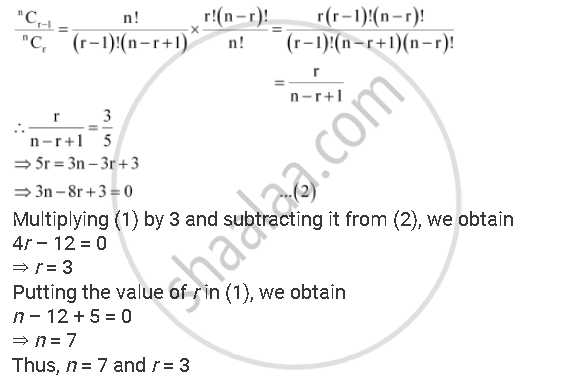Advertisements
Advertisements
प्रश्न
The coefficients of the (r – 1)th, rth and (r + 1)th terms in the expansion of (x + 1)n are in the ratio 1:3:5. Find n and r.
उत्तर


APPEARS IN
संबंधित प्रश्न
Find the coefficient of x5 in (x + 3)8
Find the coefficient of a5b7 in (a – 2b)12
Write the general term in the expansion of (x2 – yx)12, x ≠ 0
Find the middle terms in the expansions of `(3 - x^3/6)^7`
In the expansion of (1 + a)m + n, prove that coefficients of am and an are equal.
Find a positive value of m for which the coefficient of x2 in the expansion
(1 + x)m is 6
Find the middle term in the expansion of:
(i) \[\left( \frac{2}{3}x - \frac{3}{2x} \right)^{20}\]
Find the middle terms in the expansion of:
(ii) \[\left( 2 x^2 - \frac{1}{x} \right)^7\]
Find the middle terms(s) in the expansion of:
(ii) \[\left( 1 - 2x + x^2 \right)^n\]
Find the middle terms(s) in the expansion of:
(iv) \[\left( 2x - \frac{x^2}{4} \right)^9\]
Find the middle terms(s) in the expansion of:
(vi) \[\left( \frac{x}{3} + 9y \right)^{10}\]
Find the middle terms(s) in the expansion of:
(x) \[\left( \frac{x}{a} - \frac{a}{x} \right)^{10}\]
Find the term independent of x in the expansion of the expression:
(vii) \[\left( \frac{1}{2} x^{1/3} + x^{- 1/5} \right)^8\]
Find the term independent of x in the expansion of the expression:
(x) \[\left( \frac{3}{2} x^2 - \frac{1}{3x} \right)^6\]
Prove that the coefficient of (r + 1)th term in the expansion of (1 + x)n + 1 is equal to the sum of the coefficients of rth and (r + 1)th terms in the expansion of (1 + x)n.
If the coefficients of 2nd, 3rd and 4th terms in the expansion of (1 + x)n are in A.P., then find the value of n.
Find the coefficient of a4 in the product (1 + 2a)4 (2 − a)5 using binomial theorem.
If the term free from x in the expansion of \[\left( \sqrt{x} - \frac{k}{x^2} \right)^{10}\] is 405, find the value of k.
If p is a real number and if the middle term in the expansion of \[\left( \frac{p}{2} + 2 \right)^8\] is 1120, find p.
Write the middle term in the expansion of \[\left( x + \frac{1}{x} \right)^{10}\]
If A and B are the sums of odd and even terms respectively in the expansion of (x + a)n, then (x + a)2n − (x − a)2n is equal to
The middle term in the expansion of \[\left( \frac{2 x^2}{3} + \frac{3}{2 x^2} \right)^{10}\] is
If in the expansion of \[\left( x^4 - \frac{1}{x^3} \right)^{15}\] , \[x^{- 17}\] occurs in rth term, then
If in the expansion of (1 + y)n, the coefficients of 5th, 6th and 7th terms are in A.P., then nis equal to
In the expansion of \[\left( \frac{1}{2} x^{1/3} + x^{- 1/5} \right)^8\] , the term independent of x is
If rth term is the middle term in the expansion of \[\left( x^2 - \frac{1}{2x} \right)^{20}\] then \[\left( r + 3 \right)^{th}\] term is
Find the term independent of x in the expansion of `(3x - 2/x^2)^15`
Find the coefficient of `1/x^17` in the expansion of `(x^4 - 1/x^3)^15`
If p is a real number and if the middle term in the expansion of `(p/2 + 2)^8` is 1120, find p.
Find the term independent of x in the expansion of (1 + x + 2x3) `(3/2 x^2 - 1/(3x))^9`
The position of the term independent of x in the expansion of `(sqrt(x/3) + 3/(2x^2))^10` is ______.
If n is the number of irrational terms in the expansion of `(3^(1/4) + 5^(1/8))^60`, then (n – 1) is divisible by ______.
The coefficient of x256 in the expansion of (1 – x)101(x2 + x + 1)100 is ______.
The sum of the co-efficients of all even degree terms in x in the expansion of `(x + sqrt(x^3 - 1))^6 + (x - sqrt(x^3 - 1))^6, (x > 1)` is equal to ______.
Let for the 9th term in the binomial expansion of (3 + 6x)n, in the increasing powers of 6x, to be the greatest for x = `3/2`, the least value of n is n0. If k is the ratio of the coefficient of x6 to the coefficient of x3, then k + n0 is equal to ______.
